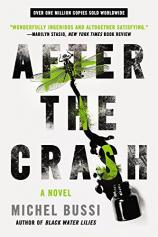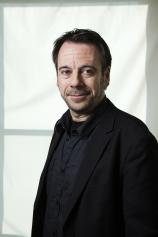Interview: January 7, 2016
Michel Bussi is one of France’s most celebrated crime authors, and he’s ready to make his mark on American readers. AFTER THE CRASH is his first book to be translated into English, and it tells the riveting story of two families --- one rich and one poor --- who are battling for custody of a child who was miraculously the sole survivor of an air flight tragedy. In this brief interview with Bookreporter.com’s Joe Hartlaub, Bussi discusses his fascination with the nature vs. nurture debate and how that inspired him to write this novel. He also talks about beginning a story at its end, as well as some of AFTER THE CRASH’s precedents in American pop culture.
Bookreporter.com: AFTER THE CRASH is built on a very original idea, one of the most original I’ve seen in quite some time: a custody dispute over an infant between two families occasioned by an air flight tragedy and that, thanks to your deft handling of the issue, cannot be resolved by DNA testing. What was your inspiration for the story? Of all the factors that make up this fascinating work, which came first for you: the plane crash, the idea of a custody battle, or something else?
Michel Bussi: The thing that came first for me was the search for identity. I wanted a situation where no one could be sure of the baby’s family. That would allow me to ask questions about nature and nurture. For example, is a child born to rich, cultivated parents but placed in a poor and simple family going to grow up differently? To allow that to happen, I had to make all those who had witnessed the baby’s first three months disappear…hence the idea of the plane crash.
BRC: The book reads quickly but is so intricate and complex (without being confusing) that it seems as if it would have required a good deal of work to put it together. How long did it take you to write the novel, from beginning to end, and what sort of writing schedule did you follow while creating it? And how did you organize your story writing?
MB: The idea for the novel was born over 20 years ago, before the development of DNA testing. If DNA testing had existed back then, perhaps I would never have thought of this story. The story wasn’t a thriller to begin with. I added the murders to make it more complex, but above all to be able to exploit the full potential of the novel’s double rhythm: a chase to find Lylie and an investigation that takes place over 18 years. I also knew the novel was working when I had the idea of starting at the end. Every reader is asking themselves what must be contained on this first page of a newspaper, and why it was necessary to wait 18 years in order to understand it.
BRC: You have written a number of other novels and had a highly successful career as a crime novelist in France. However, AFTER THE CRASH is your first book to be published in the United States. What do you think the primary appeal of the novel will be for American audiences?
MB: I know that the American public, perhaps even more so than the French public, enjoys large-scale fictional stories. For example, Clint Eastwood’s film Changeling works with some of the same ingredients, such as how to love a child even when you don’t know if it is your own. Of course, I dream of an American adaptation of this story, even if the setting is very French. In reality, this story could be transposed anywhere.




